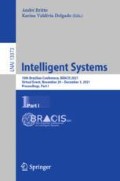Abstract
Bed allocation in hospitals is a critical and important problem, and it has become even more important since last year because of the COVID-19 pandemic. In this paper, we present an approach based on intelligent-agent technologies to assist hospital staff in charge of bed allocation. As part of this work, we developed a web-based simulation of hospital bed allocation system integrated with a chatbot for interaction with the user. As a core component in our approach, an intelligent agent uses the feedback of a plan validator to check if there are any flaws in a user-made allocation, communicating any detected problems to the user using natural language through the chatbot. Thus, our resulting application not only validates bed allocation plans but also interacts with hospital professionals using natural language communication, including giving explainable suggestions of better alternative allocations. We evaluated our approach with professionals responsible for bed allocation in two local hospitals and a doctor who provides consultancy to another local hospital. The version of the system reported in this paper addresses all the suggestions made by the specialists who evaluated its previous version.
Access this chapter
Tax calculation will be finalised at checkout
Purchases are for personal use only
Notes
- 1.
The web simulator code is available at https://github.com/smart-pucrs/bed-allocation-simulator.
- 2.
The agent code is available at https://github.com/smart-pucrs/jason_assistant_to_bed_allocation.
- 3.
The domain file with plans and problems examples are available at https://github.com/smart-pucrs/hospital-domain-PDDL.
- 4.
- 5.
- 6.
- 7.
- 8.
- 9.
- 10.
All patient data in our tests are fictitious.
- 11.
The validator code is available at https://github.com/smart-pucrs/PDDL-plan-validator.
- 12.
- 13.
References
Aeronautiques, C., et al.: PDDL— the planning domain definition language. Technical Report (1998)
Ahmadi-Javid, A., Seyedi, P., Syam, S.S.: A survey of healthcare facility location. Comput. Oper. Res. 79, 223–263 (2017)
Behnke, G., Höller, D., Biundo, S.: This is a solution! (... But is it though?) - verifying solutions of hierarchical planning problems. In: 27th International Conference on Automated Planning and Scheduling, pp. 20–28 (2017)
Bordini, R.H., Hübner, J.F., Wooldridge, M.: Programming Multi-agent Systems in AgentSpeak using Jason. Wiley, Hoboken (2007)
Engelmann, D., et al.: Dial4JaCa – a demonstration. In: Dignum, F., Corchado, J.M., De La Prieta, F. (eds.) PAAMS 2021. LNCS (LNAI), vol. 12946, pp. 346–350. Springer, Cham (2021). https://doi.org/10.1007/978-3-030-85739-4_29
Engelmann, D., et al.: Dial4JaCa – a communication interface between multi-agent systems and chatbots. In: Dignum, F., Corchado, J.M., De La Prieta, F. (eds.) PAAMS 2021. LNCS (LNAI), vol. 12946, pp. 77–88. Springer, Cham (2021). https://doi.org/10.1007/978-3-030-85739-4_7
Fox, M., Howey, R., Long, D.: Validating plans in the context of processes and exogenous events. In: 20th National Conference on Artificial Intelligence and the Seventeenth Innovative Applications of Artificial Intelligence Conference, pp. 1151–1156 (2005)
GHC: Hospital Conceição (2019). https://www.ghc.com.br/default.asp?idMenu=unidades&idSubMenu=1
Grübler, M.D.S., da Costa, C.A., Righi, R., Rigo, S., Chiwiacowsky, L.: A hospital bed allocation hybrid model based on situation awareness. Comput. Inform. Nurs. 36, 249–255 (2018)
Howey, R., Long, D., Fox, M.: VAL: automatic plan validation, continuous effects and mixed initiative planning using PDDL. In: 16th International Conference on Tools with Artificial Intelligence, pp. 294–301 (2004)
Matos, J., Rodrigues, P.P.: Modeling decisions for hospital bed management - a review. In: 4th International Conference on Health Informatics, pp. 504–507 (2011)
Ministério da Saúde: Manual de implantação e implementação : núcleo interno de regulação para Hospitais Gerais e Especializados. Technical report, Ministério da Saúde, Secretaria de Atenção à Saúde, Departamento de Atenção Hospitalar e de Urgência (2017)
e Oliveira, B., de Vasconcelos, J., Almeida, J., Pinto, L.: A simulation-optimisation approach for hospital beds allocation. Int. J. Med. Inform. 141, 104174 (2020)
Panisson, A.R., Bordini, R.H.: Knowledge representation for argumentation in agent-oriented programming languages. In: 2016 Brazilian Conference on Intelligent Systems, BRACIS (2016)
Panisson, A.R., Bordini, R.H.: Towards a computational model of argumentation schemes in agent-oriented programming languages. In: IEEE/WIC/ACM International Joint Conference on Web Intelligence and Intelligent Agent Technology (WI-IAT) (2020)
Panisson, A.R., Engelmann, D., Bordini, R.H.: Engineering explainable agents: an argumentation-based approach. In: International Workshop on Engineering Multi-Agent Systems (EMAS) (2021)
Pinto, L.R., de Campos, F.C.C., Perpétuo, I.H.O., Ribeiro, Y.C.N.M.B.: Analysis of hospital bed capacity via queuing theory and simulation. In: Proceedings of the Winter Simulation Conference 2014, pp. 1281–1292. IEEE (2014)
Proudlove, N.C., Gordon, K., Boaden, R.: Can good bed management solve the overcrowding in accident and emergency departments? Emerg. Med. J. 20, 149–155 (2003)
Teow, K.L., El-Darzi, E., Foo, C., Jin, X., Sim, J.: Intelligent analysis of acute bed overflow in a tertiary hospital in Singapore. J. Med. Syst. 36, 1873–1882 (2012)
Tsai, J.C.H., et al.: Adjusting daily inpatient bed allocation to smooth emergency department occupancy variation. In: Healthcare, vol. 8, p. 78. Multidisciplinary Digital Publishing Institute (2020)
Acknowledgements
This research was partially funded by CNPq and CAPES – Finance Code 001.
Author information
Authors and Affiliations
Corresponding author
Editor information
Editors and Affiliations
Rights and permissions
Copyright information
© 2021 Springer Nature Switzerland AG
About this paper
Cite this paper
Engelmann, D.C., Cezar, L.D., Panisson, A.R., Bordini, R.H. (2021). A Conversational Agent to Support Hospital Bed Allocation. In: Britto, A., Valdivia Delgado, K. (eds) Intelligent Systems. BRACIS 2021. Lecture Notes in Computer Science(), vol 13073. Springer, Cham. https://doi.org/10.1007/978-3-030-91702-9_1
Download citation
DOI: https://doi.org/10.1007/978-3-030-91702-9_1
Published:
Publisher Name: Springer, Cham
Print ISBN: 978-3-030-91701-2
Online ISBN: 978-3-030-91702-9
eBook Packages: Computer ScienceComputer Science (R0)

